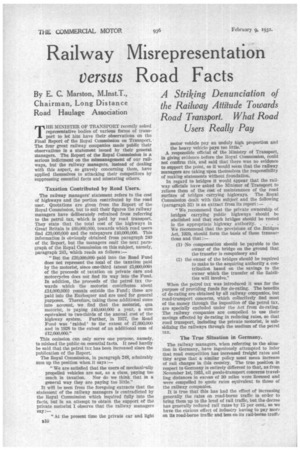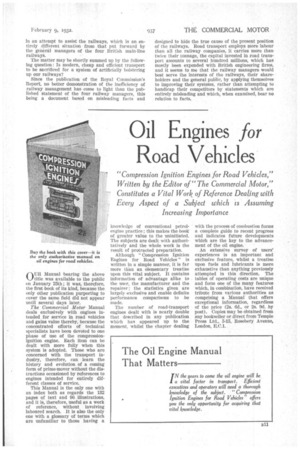Railway Misrepresentation
Page 44

Page 45

If you've noticed an error in this article please click here to report it so we can fix it.
Versus Road Facts
A Striking Denunciation of the Railway Attitude Towards Road Transport. What Road Users Really Pay
By E. C. Marston, M.Inst.T., Chairman, Long Distance Road Haulage Association
THE MINISTER OF TRANSPORT recently asked representative bodies of various forms of transport to let him have their observations on the Final Report of the Royal Commission on Transport. The four great railway companies made public their observations in a statement issued by their general managers. The Report of the Royal Commission is a serious indictment on the mismanagement of our railways, but the railway managers, instead of dealing with this aspect, so gravely concerning them, have applied themselves to attacking their competitors by suppressing essential facts and misstating others.
Taxation Contributed by Road Users.
The railway managers' statement refers to the cost of highways and the portion contributed by the road user. Quotations are given from the Report of the Royal Commission, but to suit their figures the railway managers have deliberately refrained from referring to the petrol tax, which is paid by road transport. They state that the total cost of the highways in Great Britain is £60,000,000, towards which road users find £20,000,000 and the ratepayers £40,000,000. This information is obviously obtained from paragraph 240 of the Report, but the managers omit the next paragraph of the Royal Commission on this subject, namely, paragraph 241, which reads as follows:—
" But the £20,000,000 paid into the Road Fund does not represent the total of the taxation paid by the motorist, since one-third (about £5,000,000) of the proceeds of taxation on private cars and motorcycles does not find its way into the Fund. In addition, the proceeds of the petrol tax (towards which the motorist contributes about 04,000,000) remain outside the Fund ; these are paid into the Exchequer and are used for general purposes. Therefore, taking these additional sums into account, we find that the motorist, qua motorist, is paying 140,000,000 a year, a sum equivalent to two-thirds of the annual cost of the highway system. Further, in 1927, the Road Fund was ` raided ' to the extent of £7,000,000 and in 1928 to the extent of an additional sum of £12,000,000."
This omission can only serve one purpose, namely, to mislead the public on essential facts. It need hardly be said that the petrol tax has been increased since the publication of the Report.
The Royal Commission, in paragraph 248, admirably sum up the position when it says:— "We are satisfied that the users of mechanieally propelled vehicles are not, as a class, paying too much in taxation. Nor do we think that in a general way they are paying too little."
It will be seen from the foregoing extracts that the statement of the railway managers is contradicted by the Royal Commission which inquired fully into the facts, but in an attempt to obtain the support of the private motorist I observe that the railway managers say:— " At the present time the private car and light s10 motor vehicle pay an unduly high proportion and the heavy vehicle pays too little."
A responsible official of the Ministry of Transport, in giving evidence before the Royal Commission, could not confirm this, and said that there was no evidence to support the point, so it would seem that the railway managers are taking upon themselves the responsibility of making statements without foundation.
In regard to bridges it would appear that the railway officials have asked the Minister of Transport to relieve them of tile cost of maintenance of the road surface of bridges carrying highways. The Royal Commission dealt with this subject and the following (paragraph 32) is an extract from its report :— " We recommend that the private ownership of bridges carrying public highways should be abolished and that such bridges should be vested in the appropriate' highway authority. . . . .
• We recommend that the provisions of the Bridges Act, 1929, should form the basis of these transac tions and that .
(1) No compensation should be payable to the owner of the bridge on the ground that the transfer is compulsory and (2) the owner of the bridges should be required to make to the acquiring authority a contribution based on the savings to the owner which the transfer of the liabilities will involve."
When the petrol tax was introduced it was for the purpose of providing funds for de-rating. The benefits of de-rating are obtained by all railway companies, but road-transport concerns, which collectively find most of the money through the imposition Of the petrol tax, are specially excluded under the Act from de-rating. The railway companies are compelled to use their savings effected by de-rating in reducing rates, so that road transport, including the private motorist, is subsirliy.ing the railways through the medium of the petrol tax.
The True Situation in Germany.
The railway managers, when referring to the situation in Germany, have ingeniously attempted to infer that road competition has increased freight rates and they argue that a similar policy must mean increase of rail charges in this country. The true position in respect to Germany is entirely different to that, as from November 1st, 1931, all goods-transport concerns travelling distances in excess of 30 miles were licensed and were compelled to quote rates equivalent to those of the railway companies.
It is true that this has had the effect of increasing generally the rates on road-borne traffic in order to bring them up to the level of rail traffic, but the decree has generally reduced rail rates by 15 per cent., so we have the curious effect of industry having to pay more on its road-borne traffic and less on its rail-borne trailic in an attempt to assist the railways, which is an .entirely different situation from that put forward by the general managers of the four British main-line railways.
The matter may be shortly summed up by the following question : Is modern, cheap and efficient transport to be sacrificed for a system of artificially bolstering up our railways?
Since the publication of the Royal Commission's Report, no better demonstration of the inefficiency of railway management has come to light than the published statement of the four railway managers, this being a document based on misleading facts and
designed to hide the true cause of the present position of the railways. Road transport employs more labour than all the railway companies, it carries more than twice their tonnage, the capital invested in road transport amounts to several hundred millions, which has mostly been expended with British engineering firms, and it seems to me that the railway managers would best serve the interests of the railways, their shareholders and the general public, by applying themselves to improving their systems, rather than attempting to handicap their competitors by statements which are entirely misleading and which, when examined, bear no relation to facts.




























































































